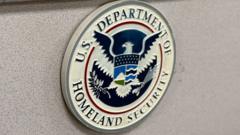In a significant policy shift, the Trump administration announced the end of Temporary Protected Status (TPS) for approximately 14,600 Afghans and 7,900 Cameroonians, a move that raises concerns for those affected by current crises in their home countries. Homeland Security Secretary Kristi Noem stated that conditions in Afghanistan and Cameroon no longer justify the protections implemented under TPS.
Trump Administration Ends Protected Status for Afghans and Cameroonians

Trump Administration Ends Protected Status for Afghans and Cameroonians
The U.S. Department of Homeland Security announces the termination of Temporary Protected Status for thousands of Afghans and Cameroonians, effective May and June 2023.
TPS, which provides deportation protection and work permits for nationals from designated countries experiencing unsafe conditions, was previously extended for Afghans until May 2023 by then Secretary Alejandro Mayorkas. However, in March, Noem determined that the assessments had changed, leading to the termination of protections for both countries.
This announcement coincided with a ruling allowing the deportation of individuals involved in pro-Palestinian protests, showcasing a strategy focused on immigration enforcement under the Trump administration. The uproar includes the revocation of protections for over half a million migrants from other nations as well.
Individuals like Shukriah, an Afghan refugee currently living in Washington D.C. with her family, expressed deep anxiety regarding her uncertain future, having received directives from the Department of Homeland Security to leave the U.S. immediately. Shukriah's story highlights the more extensive ramifications of this policy shift on real families, as many face the threat of deportation amidst fear and uncertainty.
The administration's approach to immigration issues, particularly during the Trump presidency, has seen a continuous emphasis on stringent enforcement policies. Recent reports indicate that deportations are being prioritized once again, echoing the hardline stance that characterized Trump’s earlier governance.
The response to these developments is multifaceted, with legal representatives and advocates vowing to challenge these decisions while the broader community grapples with the implications of living under shifting immigration laws. As the situation evolves, the focus remains on how these changes will impact vulnerable populations seeking safety and stability in the United States amid ongoing geopolitical tensions.
This announcement coincided with a ruling allowing the deportation of individuals involved in pro-Palestinian protests, showcasing a strategy focused on immigration enforcement under the Trump administration. The uproar includes the revocation of protections for over half a million migrants from other nations as well.
Individuals like Shukriah, an Afghan refugee currently living in Washington D.C. with her family, expressed deep anxiety regarding her uncertain future, having received directives from the Department of Homeland Security to leave the U.S. immediately. Shukriah's story highlights the more extensive ramifications of this policy shift on real families, as many face the threat of deportation amidst fear and uncertainty.
The administration's approach to immigration issues, particularly during the Trump presidency, has seen a continuous emphasis on stringent enforcement policies. Recent reports indicate that deportations are being prioritized once again, echoing the hardline stance that characterized Trump’s earlier governance.
The response to these developments is multifaceted, with legal representatives and advocates vowing to challenge these decisions while the broader community grapples with the implications of living under shifting immigration laws. As the situation evolves, the focus remains on how these changes will impact vulnerable populations seeking safety and stability in the United States amid ongoing geopolitical tensions.





















